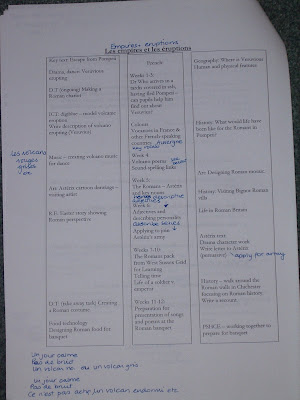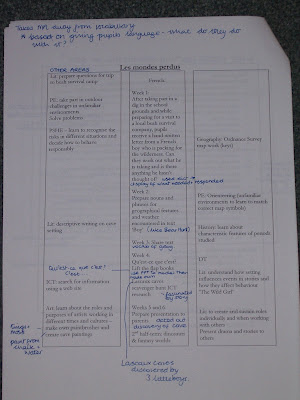Reporting back from PLS #3 – Get creative! Embedding primary languages in an enriched curriculum

The abstract for this session promised –
‘This workshop will look at ways in which Primary Languages can play a central part in a relevant, exciting primary curriculum which engages young learners through stimulating contexts, stunning starts and fabulous finishes! Rather than treating PL as a bolt on extra, & schools in West Sussex have committed to placing PL at the heart of their curriculum. From commotion under the ocean, through lost worlds, empires and eruptions and into the unknown, all with a global dimension…’
Sounded intriguing – and turned out to be inspirational.
Elaine Minett, Primary MFL advisory teacher for West Sussex presented the project to us, explaining that it stemmed from a focus on a creative curriculum in the LA, and on raising standards in Foundation subjects through developing skills, producing successful learners who
- Enjoy learning
- Make progress
- Achieve
- Make progress in attributes, attitudes, skills, knowledge and understanding
- Experience relevant learning opportunities (ECM)
She shared that deep learning was the underpinning concept – how can learning be made memorable? She shared that key thoughts included a learning journey, first hand experience, use of environment, focus on talk, quality texts, celebrating learning, and making meaningful connections. A couple of aspects I’d pick out as particularly interesting are
Exciting contexts –The Romans became ‘Empires and Eruptions /Les empires et les éruptions’; Underwater worlds sounds much more mysterious called ‘The hidden forest / le foret cachée’; Prehistory was renamed ‘Lost World / Les mondes perdus’
Stunning starts and fabulous finishes – each project (lasting a term) had a really special opening activity or experiences – and the kids were hooked, inspired, gobsmacked, the lot for the whole topic. Equally, the end of the project was celebrated and had a ‘fabulous finish’ – bookending the experience.
Some examples of the starters-
– Voyage dans l’inconnu began with the pupils returning from Christmas to discover a crater in the school grounds, containing bits of metal and an advert for ‘jeunes astronautes’ in French, calling for fit young people.
– For Les empires et les eruptions, Dr Who arrived in the school hall in his TARDIS, covered in volcanic ash having escaped Pompeii. Can the pupils find out more about what happened to Vesuvius and volcanoes in general – are there any in France?
– Les mysteres de Paris – pupils ‘flew’ to Paris courtesy of the local college who have half a plane (see later post for another way of doing this if you don’t know anyone with half a plane :o) )
So – what sort of things did they do?
Each school did a baseline assessment of skills, attitudes and integration of MFL into school at the start and from this wrote individualised targets for the school. Then each school looked at existing curriculum and, using the targets as a starting point, created a topic or module lasting 6 or 12 weeks that enmeshed all the subjects including MFL (in most cases French) .
I’ve taken pictures of some of the plans- hope you can read them 😮
 (A tip – if you click them, they get bigger!)
(A tip – if you click them, they get bigger!)
(please excuse the scribbles – can’t find the ‘blank’ copy I picked up)
At the end of the project, the results were really exciting. Benefits included:
- increased motivation for pupils and teachers
- increased time spent ‘doing’ French, but no feeling that anything had been squeezed out in doing so
- big impact on literacy
- increased parent – child conversation about school work!
- attendance improved as pupils didn’t want to miss things.
Some quotes from particpants –
‘Science and Maths are linked to French somehow’
‘The talk which went on on the launch day would have fulfilled my Speaking and Listening objectives for the whole term’
‘The children are excited about learning’
‘I’m doing more language but I don’t feel it’s encroaching on other areas’
And the one I liked best:
‘Just because pupils are in KS2, why does creativity have to stop?‘
AMEN!!
I love this approach – I’m all for creative curriculum planning and in the light of recent posts about the preponderance of literacy and numeracy, it’s heartening to see the use of other areas of the curriculum enhancing these skills.
Elaine pointed out that this wouldn’t necessarily be a termly event, but rather something that was done every year / two years. As such it seems a great idea – manageable and a truly thrilling activity for pupils and teachers – one final quotation from a teacher –
‘I don’t know who is more enthusiastic – the kids or me!’


